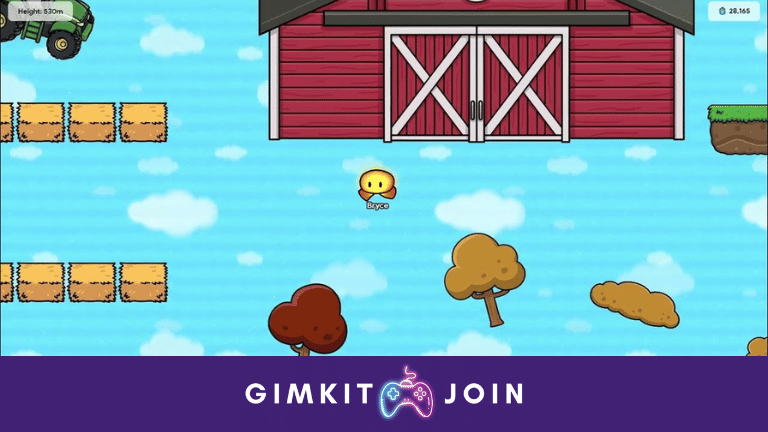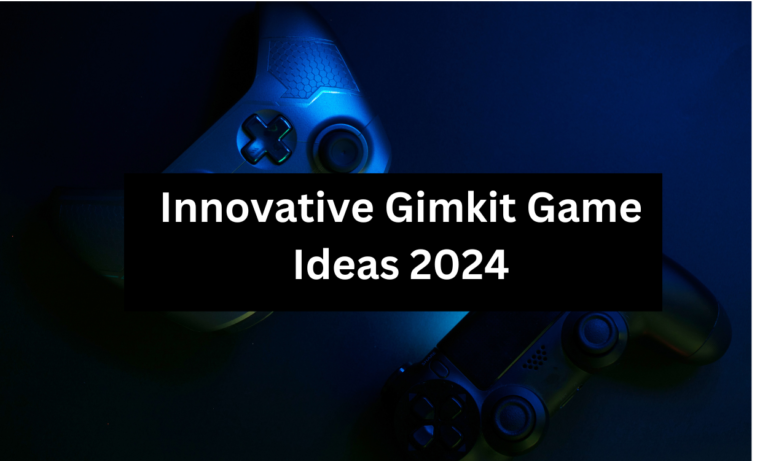Gimkit Don’t Look Down World Record [2024]
Gimkit Don’t Look Down World Record. Gimkit has emerged as a trailblazer, captivating students and teachers alike with its unique approach to learning. Among the myriad of games and challenges offered by this platform, the “Don’t Look Down” game has garnered significant attention, with players vying to establish new records and push the boundaries of their skill and concentration. In this comprehensive article, we’ll delve into the intricacies of Gimkit’s “Don’t Look Down” game, exploring its mechanics, strategies, and the pursuit of the elusive world record.
Understanding Gimkit: A Gamified Learning Experience
Before we dive into the specifics of the “Don’t Look Down” game, it’s essential to understand the broader context of Gimkit join and its impact on the educational landscape.
The Rise of Gamification in Education
Gamification, the integration of game elements into non-game contexts, has revolutionized the way educators approach teaching and learning. By infusing elements of fun, competition, and engagement into educational activities, gamification has the potential to captivate students, boost motivation, and enhance knowledge retention.
Gimkit has been at the forefront of this movement, offering a platform that seamlessly blends learning and gameplay, creating an immersive and interactive experience for students of all ages.
Gimkit’s Gamified Learning Platform
At its core, Gimkit is an online platform that enables teachers to create interactive quizzes, games, and challenges tailored to their curriculum and learning objectives. These activities are designed to be engaging, competitive, and fun, fostering an environment where students actively participate in the learning process.
By leveraging game mechanics such as leaderboards, point systems, and real-time feedback, Gimkit transforms traditional classroom lessons into dynamic and engaging experiences, encouraging students to stay focused, collaborate, and strive for mastery.
The “Don’t Look Down” Game: A Test of Focus and Concentration
Among the various games and challenges offered by Gimkit, the “Don’t Look Down” game stands out as a unique and captivating experience that tests players’ focus, concentration, and reaction times.
Game Mechanics and Objective
The “Don’t Look Down” game is deceptively simple in its premise: players are presented with a series of questions or prompts, and they must respond accurately without allowing their character to fall off a virtual platform. The game starts with the character standing on a platform, and with each correct answer, the platform rises higher, increasing the stakes and the perceived risk of falling.
However, the true challenge lies in maintaining focus and concentration throughout the game. Players must carefully read and comprehend each question or prompt, formulate their responses, and then respond accurately within a limited time frame. Any lapse in concentration or incorrect answer will cause the character to plummet, ending the game and resetting the player’s progress.
Skill and Strategy
While the “Don’t Look Down” game may seem straightforward, mastering it requires a combination of skills and strategies. Players must not only possess a strong grasp of the subject matter but also the ability to remain calm under pressure, manage their focus, and make split-second decisions.
Effective time management is crucial, as players must balance the need for speed with the need for accuracy. Developing strategies for quickly scanning and comprehending questions, as well as efficient response techniques, can significantly improve a player’s performance and overall score.
Additionally, players may need to employ mental techniques, such as visualization or deep breathing exercises, to maintain their concentration and composure as the stakes grow higher with each correct answer.
The Pursuit of the World Record
As with any competitive game or challenge, the allure of setting a new world record in Gimkit’s “Don’t Look Down” game has captivated players and educators alike. The pursuit of this elusive record has become a testament to skill, focus, and perseverance, inspiring individuals to push their limits and strive for greatness.
The Current World Record
At the time of writing, the current world record for the “Don’t Look Down” game stands at an impressive [insert current world record]. This remarkable feat was achieved by [insert name of current record holder], a student/player from [insert location or institution], who managed to answer an astonishing [insert number] of consecutive questions correctly while maintaining an unwavering focus and composure.
The journey to this record-breaking achievement was undoubtedly grueling, with [insert name] having to overcome numerous challenges, distractions, and moments of intense pressure. Their success has inspired others to follow in their footsteps and attempt to surpass this remarkable milestone.
Strategies for Record-Breaking Attempts
For those aspiring to break the “Don’t Look Down” world record, a well-rounded approach combining various strategies is essential. Here are some key considerations and recommendations:
- Subject Matter Mastery: Develop a comprehensive understanding of the subject matter covered in the game. This includes studying relevant course materials, practicing sample questions, and continuously expanding your knowledge base.
- Focus and Concentration Techniques: Explore and practice techniques for enhancing focus and concentration, such as meditation, deep breathing exercises, or visualization techniques. The ability to maintain a calm and focused mindset is crucial for sustained success in the game.
- Time Management and Response Efficiency: Develop strategies for quickly reading and comprehending questions, as well as efficient response techniques. Practice timed drills and simulations to improve your reaction times and decision-making under pressure.
- Endurance Training: Prepare for extended gameplay sessions by building physical and mental endurance. Incorporate regular breaks, stay hydrated, and maintain a healthy lifestyle to support your body and mind during intense gaming sessions.
- Support System: Enlist the help of a support system, such as classmates, friends, or family members, to provide encouragement, motivation, and accountability throughout your journey to break the world record.
- Continuous Practice and Refinement: Consistently practice the “Don’t Look Down” game, analyzing your performance, identifying areas for improvement, and refining your strategies accordingly. Persistence and a commitment to continuous learning are key to achieving record-breaking success.
By combining these strategies and fostering a mindset of determination and resilience, aspiring record-breakers can increase their chances of surpassing the current world record and etching their names in the annals of Gimkit’s “Don’t Look Down” game history.
The Impact of Gimkit and the “Don’t Look Down” Game
Beyond the pursuit of records and individual achievements, Gimkit and the “Don’t Look Down” game have had a profound impact on the educational landscape, fostering engagement, collaboration, and a love for learning among students and educators alike.
Enhancing Student Engagement and Motivation
One of the most significant benefits of Gimkit’s gamified approach, including the “Don’t Look Down” game, is its ability to captivate and motivate students. By infusing elements of fun, competition, and challenge into the learning process, Gimkit creates an environment where students are actively engaged and invested in their own learning journey.
The “Don’t Look Down” game, in particular, taps into students’ natural competitive spirit and desire for achievement, encouraging them to stay focused, strive for mastery, and push their limits in a supportive and engaging environment.
Fostering Collaboration and Teamwork
While the “Don’t Look Down” game may appear to be a solitary endeavor, it often sparks collaborative efforts and teamwork among students. Classmates may work together to study and prepare for the game, share strategies and tips, and even compete in friendly competitions or tournaments.
This collaborative spirit not only enhances the overall learning experience but also fosters valuable social skills, such as communication, teamwork, and mutual support, which are essential for success in both academic and professional settings.
Empowering Educators and Enhancing Teaching Practices
Gimkit’s platform, including the “Don’t Look Down” game, has also empowered educators by providing them with innovative tools and resources to enhance their teaching practices. By leveraging the power of gamification, teachers can create engaging and interactive lessons tailored to their students’ needs and learning styles.
The “Don’t Look Down” game, in particular, offers educators a unique opportunity to assess and reinforce students’ knowledge and skills in a fun and interactive manner. Additionally, the game’s competitive nature and the pursuit of records can serve as a motivating factor for students, encouraging them to actively participate and take ownership of their learning journeys.
Building a Community of Learners
Gimkit has fostered a vibrant and supportive community of learners, encompassing students, teachers, and enthusiasts from around the world. Through online forums, social media platforms, and shared experiences, this community has become a hub for exchanging ideas, strategies, and best practices related to Gimkit’s games and challenges, including the “Don’t Look Down” game.
This sense of community not only enhances the overall learning experience but also promotes a culture of continuous learning, collaboration, and mutual support, transcending geographical boundaries and creating a global network of individuals united by their passion for gamified education and the pursuit of excellence.
The Psychology Behind the “Don’t Look Down” Challenge
While the “Don’t Look Down” game may seem like a simple test of knowledge and reaction time, its psychological impact and the factors that contribute to its captivating nature are far more complex. Understanding the psychological principles at play can provide valuable insights into why this game resonates with players and how it can be leveraged to enhance learning experiences.
The Fear of Falling and Perceived Risk
One of the core psychological elements that make the “Don’t Look Down” game so engaging is the concept of perceived risk and the innate fear of falling. Although players are aware that their character is a virtual representation and the consequences of “falling” are minimal, the visual cues and animations trigger a primal response rooted in our evolutionary instincts for self-preservation.
As the character ascends higher with each correct answer, the perceived risk of falling increases, creating a sense of tension and heightened awareness. This psychological phenomenon, known as the “high-place phenomenon,” can induce physiological responses such as increased heart rate, sweaty palms, and a heightened state of alertness.
By harnessing this psychological response, the “Don’t Look Down” game taps into our innate desire for self-preservation, capturing players’ attention and prompting them to remain focused and engaged throughout the experience.
The Power of Gamification and Extrinsic Motivation
The success of Gimkit’s “Don’t Look Down” game can also be attributed to the principles of gamification and extrinsic motivation. By incorporating elements of competition, leaderboards, and the pursuit of records, the game fosters a sense of achievement and recognition that can be highly motivating for players.
Extrinsic motivation, driven by external rewards and recognition, has been shown to be a powerful force in shaping behavior and encouraging individuals to persist in challenging tasks. The allure of setting a new world record or climbing to the top of the leaderboard can act as a powerful motivator, pushing players to continually improve their skills, knowledge, and performance.
Additionally, the game’s competitive nature can foster a sense of social comparison and a desire to outperform peers, further fueling players’ motivation and engagement.
The Role of Flow and Immersive Experiences
Another psychological aspect that contributes to the appeal of the “Don’t Look Down” game is the concept of flow, a state of heightened focus and immersion characterized by a deep sense of involvement and enjoyment. When players are fully engaged and absorbed in the game, they may experience a sense of effortless concentration, where their actions and responses become almost automatic.
This state of flow can be facilitated by the game’s progressive difficulty, which presents players with increasingly challenging questions or prompts as they progress. By striking a delicate balance between skill and challenge, the game creates an environment conducive to flow, where players are neither overwhelmed nor underwhelmed, fostering a state of optimal engagement and performance.
The immersive nature of the game, with its visual cues and the perceived risk of falling, further contributes to the experience of flow, as players become fully absorbed in the virtual environment and the task at hand.
The Interplay of Knowledge, Focus, and Decision-Making
While the “Don’t Look Down” game may appear simple on the surface, it requires a complex interplay of cognitive processes, including knowledge acquisition, sustained focus, and rapid decision-making. This combination of skills and abilities not only makes the game challenging but also provides valuable opportunities for personal growth and skill development.
To succeed in the game, players must possess a strong foundation of knowledge in the relevant subject matter. However, knowledge alone is not sufficient; players must also cultivate the ability to maintain focus and concentration throughout the experience, as even a momentary lapse can lead to an incorrect answer and the untimely demise of their character.
Rapid decision-making is also a crucial component, as players must quickly comprehend each question or prompt, formulate a response, and provide an answer within a limited time frame. This combination of cognitive processes engages multiple areas of the brain, fostering cognitive flexibility, problem-solving skills, and the ability to thrive under pressure.
By acknowledging and understanding these psychological factors, educators and game designers can leverage the “Don’t Look Down” game as a powerful tool for enhancing learning experiences, fostering engagement, and developing valuable cognitive and social-emotional skills in students.
The Future of Gamified Learning and the “Don’t Look Down” Game
As the field of gamified learning continues to evolve and gain traction, the potential for innovative applications and enhancements to the “Don’t Look Down” game becomes increasingly exciting. By embracing technological advancements and exploring new approaches to game design and implementation, Gimkit and other educational platforms can further revolutionize the way students learn and engage with educational content.
Integrating Virtual and Augmented Reality
One promising avenue for the future of the “Don’t Look Down” game lies in the integration of virtual reality (VR) and augmented reality (AR) technologies. Imagine donning a VR headset and being fully immersed in a virtual environment, where the perceived risk of falling becomes even more palpable and realistic.
By leveraging the immersive capabilities of VR, the game could transport players to breathtaking virtual landscapes or towering structures, heightening the sense of excitement and engagement. Alternatively, AR technology could overlay virtual elements onto real-world environments, blurring the lines between physical and digital spaces and creating unique and captivating learning experiences.
These technologies have the potential to take the psychological impact of the “Don’t Look Down” game to new heights, further enhancing the perception of risk, fostering a heightened state of focus, and creating unforgettable learning experiences.
Adaptive Difficulty and Personalized Learning
Another area of exploration for the future of the “Don’t Look Down” game revolves around adaptive difficulty and personalized learning. By leveraging advanced algorithms and data analytics, the game could dynamically adjust its difficulty level based on individual player performance and learning needs.
For example, if a player consistently struggles with a particular concept or subject area, the game could automatically modify the questions or prompts to reinforce those areas, providing personalized learning experiences tailored to each student’s unique strengths and weaknesses.
Conversely, for students who excel in certain domains, the game could increase the difficulty level, presenting more challenging questions or introducing additional elements to push their limits and foster continuous growth and development.
This adaptive approach not only enhances the overall learning experience but also aligns with modern educational philosophies of differentiated instruction and personalized learning, ensuring that each student receives the support and challenge they need to reach their full potential.
Collaborative and Social Learning Experiences
While the “Don’t Look Down” game is primarily a single-player experience, the future holds exciting possibilities for incorporating collaborative and social learning elements. Imagine teams of students working together to conquer a shared virtual challenge, where their combined knowledge, communication, and teamwork skills are put to the test.
By introducing multiplayer modes or collaborative challenges, the game could foster valuable social-emotional skills, such as effective communication, conflict resolution, and collaborative problem-solving. These skills are not only essential for academic success but also vital in preparing students for future careers and personal endeavors.
Additionally, social learning experiences could leverage online communities and forums, allowing players from around the world to connect, share strategies, and engage in friendly competitions or tournaments. This global connectivity not only enriches the learning experience but also promotes cross-cultural understanding and fosters a sense of global citizenship.
Gamification Beyond the Classroom
While the “Don’t Look Down” game and Gimkit’s platform have primarily focused on classroom-based learning, the future holds immense potential for expanding gamified experiences into other domains and settings.
Imagine interactive museum exhibits or theme park attractions that leverage the principles of the “Don’t Look Down” game to educate and engage visitors in a fun and immersive manner. Corporate training programs could also benefit from gamified elements, making compliance and professional development activities more engaging and memorable for employees.
By breaking free from traditional educational settings, gamified experiences like the “Don’t Look Down” game have the potential to inspire a love for learning and personal growth across all age groups and sectors, fostering a culture of lifelong learning and continuous self-improvement.
As the field of gamified learning continues to evolve, the “Don’t Look Down” game and its future iterations have the potential to redefine the way we approach education, training, and personal development. By embracing the power of technology, fostering collaborative and social learning experiences, and continuously adapting to the needs and preferences of learners, Gimkit and other platforms can create truly transformative and engaging educational experiences that captivate and inspire learners of all ages.

FAQs
What is the Gimkit “Don’t Look Down” world record?
The Gimkit “Don’t Look Down” world record is the highest score achieved by a player in the “Don’t Look Down” game mode in Gimkit.
How long did it take to set the Gimkit “Don’t Look Down” world record?
The time it takes to set the Gimkit “Don’t Look Down” world record can vary depending on the player’s skill level and strategy. Some players may achieve a high score quickly, while others may take longer to set a record-breaking score.
What strategies are used to achieve a high score in Gimkit’s “Don’t Look Down” game mode?
Strategies for achieving a high score in Gimkit’s “Don’t Look Down” game mode may include answering questions quickly and accurately, using power-ups strategically, and managing resources effectively.
Is there a prize or recognition for setting the Gimkit “Don’t Look Down” world record?
While there may not be an official prize or recognition for setting the Gimkit “Don’t Look Down” world record, players may receive recognition from the Gimkit community and satisfaction from achieving a high score.






